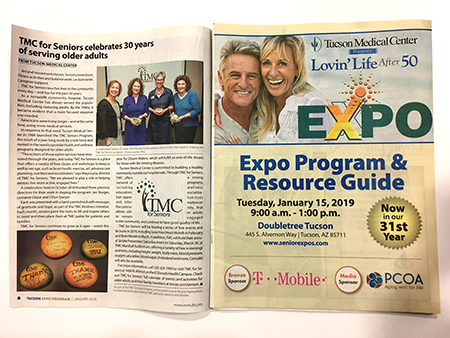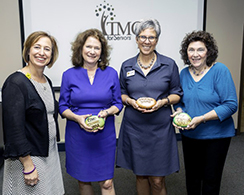 The program guide for the Lovin’ Life After 50 Expo(link is external), held Jan. 15 at the Doubletree Tucson Reid Park at 445 S. Alvernon Way, put the spotlight on Lorraine Glazar, clinical division senior manager in the University of Arizona Department of Medicine for business operations of the Division of Cardiology and Division of Infectious Diseases.
The program guide for the Lovin’ Life After 50 Expo(link is external), held Jan. 15 at the Doubletree Tucson Reid Park at 445 S. Alvernon Way, put the spotlight on Lorraine Glazar, clinical division senior manager in the University of Arizona Department of Medicine for business operations of the Division of Cardiology and Division of Infectious Diseases.
In an article on page 8 of the guide (click image to enlarge), she is recognized as one of three past directors of the TMC Seniors Program, celebrating its 30th anniversary at Tucson Medical Center. She started at TMC in 1991 and later led the program, then known as Oasis, as TMC director of senior services (1996-98).
“Oasis is best described for being a school for seniors,” Glazar said. “It included a lot of arts and humanities and health and wellness activities as well as lectures and other projects. The curriculum was developed by Marylen Mann in St. Louis as an institute model for flexible local delivery.”
Afterward, she moved into TMC physician recruiting as a business development specialist. She later joined one of the first CMS accountable healthcare organizations (ACO) in the state, Arizona Connected Care, which was a subsidiary of TMC. She left that to join another ACO known as Scottsdale Health Partners.
 Glazar, second from the left in picture at left, joined the staff at the UA College of Medicine – Tucson in 2015. Much of her work still involves physician recruiting and business development for the UA Sarver Heart Center, and Divisions of Cardiology and Infectious Diseases.
Glazar, second from the left in picture at left, joined the staff at the UA College of Medicine – Tucson in 2015. Much of her work still involves physician recruiting and business development for the UA Sarver Heart Center, and Divisions of Cardiology and Infectious Diseases.
She and the other two former TMC senior services directors were honored for their work in shaping the program at an event in October 2018. Each was presented a painted stone with the TMC for Seniors logo and a big “Thank You.”
"The painted stones," Glazar said, "are part of the Ben’s Bells kindness initiative. One of the artists at Ben’s Bells taught Senior Services volunteers to paint the stones. They paint them with words of encouragement and leave them in the many patios in and around the inpatient units. Patients and, more often, their family members/caregivers are encouraged to take one home."

